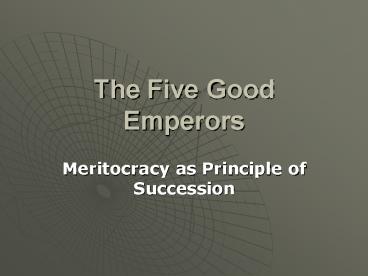The Five Good Emperors - PowerPoint PPT Presentation
1 / 15
Title:
The Five Good Emperors
Description:
'In the second century of the Christian era the empire of Rome comprehended the ... Edward Gibbon, The Decline and Fall of the Roman Empire. Nerva and Trajan ... – PowerPoint PPT presentation
Number of Views:459
Avg rating:3.0/5.0
Title: The Five Good Emperors
1
The Five Good Emperors
- Meritocracy as Principle of Succession
2
In the second century of the Christian era the
empire of Rome comprehended the fairest part of
the earth and the most civilized portion of
mankind. The frontiers of that extensive monarchy
were guarded by ancient renown and disciplined
valor. The gentle but powerful influence of laws
and manners had gradually cemented the union of
the provinces.During a happy period of more than
fourscore years, the public administration was
conducted by the virtue and abilities of Nerva,
Trajan, Hadrian, and the two Antonines.Edward
Gibbon, The Decline and Fall of the Roman Empire
3
Nerva and Trajan
- Nerva, the Venerable Senator (96-98 CE)
- Adoption of Trajan Shades of Galba and Piso in
68 - Trajan, the Expansionist Emperor (98-117 CE)
- Provincial Origins (Spain)
- Military Emperor
- Governor of Upper Germany in 97 CE
- First (101-102) and Second (105-106) Dacian Wars
- Dacia as Province (106 CE)
- Annexation of Arabia Petraea (106 CE)
- Parthian War (113-116 CE) Annexation of Armenia
(114 CE)
4
Trajans Column
5
The Roman Empire in the Time of Trajan
6
Hadrian and Pius
- Hadrian, the Philhellenic Emperor (117-138 CE)
- Commander in Trajans Dacian and Parthian Wars
- Triumph of Provinces (Spain)
- Triumph of Hellenism Tour of Greece (125-127 CE)
- Antoninus Pius, the Quiet Emperor (138-161 CE)
7
(No Transcript)
8
Bust of Hadrian Museo delle Terme Rome
9
Hadrians Pantheon
10
(No Transcript)
11
Bust of Hadrian
12
Hadrians Wall
13
Marcus Aurelius (161-180 CE)
- Reigns as co-regent with Lucius Verus (161-169
CE) - The Philosopher-King Meditations
- End of the Golden Age of the Antonines
- Marcomannic Wars (170-174 CE)
- Return to Hereditary Succession Commodus
(180-192 CE)
14
Gilded Bronze Equestrian Statue Of M.
Aurelius Rome, Capitol
15
Meritocracy as Principle of SuccessionWe
witnessed the extreme of servitude, when the
informer robbed us of the interchange of speech
and hearing. We should have lost memory as well
as voice, had it been as easy to forget as to
keep silence. Now at last our spirit is
returningat the dawn of a most happy age Nerva
Caesar blended things once irreconcilable,
sovereignty and freedom.Tacitus, Agricola 2-3
(cf. Histories 1.1)































